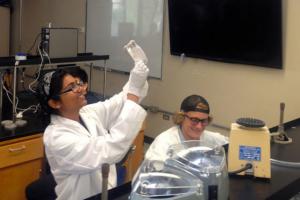Thanks to superbugs, scientists are always on the lookout for new sources of antibiotics. Many come from microbes found in soil, where they have been waging war on one another for eons.
Dirt found at a UC Santa Barbara restoration site has produced three different bacteria, two capable of killing fungal species and one that can kill multidrug-resistant MRSA (methicillin-resistant Staphylococcus aureus). Even more astonishing: The discovery was made by 20 UCSB freshmen as part of their work in a new class, Research for Undergraduates - Molecular Biology Experience (RUMBLE).
Offered by the campus’s Department of Molecular, Cellular, and Developmental Biology, the course is part of UCSB’s BioMentors program, an initiative funded by the Howard Hughes Medical Institute. Sixty percent of all undergraduates who enter college intending to major in science, technology, engineering and mathematics (STEM) do not complete bachelor’s degrees in any of those disciplines. RUMBLE’s curriculum is designed to increase the success and retention of STEM majors by building learning communities that engage students and instructors in a highly interactive environment.


